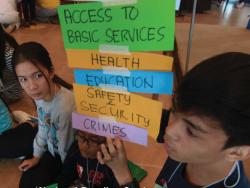The Philippines Ministry affirms SOGI rights in schools

20 July 2017 - On June 29, the Philippines’ Department of Education (DepEd) issued a gender-responsive basic education policy that calls for an end to discrimination based on gender, sexual orientation and gender identity in schools. Human Rights Watch applauds the new policy but encourages the government to implement it adequately.
Anti-Bullying Law
The Philippines has been a leader in affirming the rights of LGBT youth in the past few years. In 2012, the Department of Education issued a child protection policy to prevent and address bullying in schools. The policy includes bullying on the basis of sexual orientation and gender identity. In 2013 protections were strengthened by enacting an Anti-Bullying Law. Anti-Bullying Law expressly prohibits bullying of LGBT youth. This is the first law of its kind in Asia and among the first worldwide.
Normalization of violence in schools
Bullying remains a serious problem in The Philippines. In December, a research by UNICEF reported that 80% of the Filipino children experience abuse. It was said that the normalization of violence was worrisome. More than half of respondents' (57.4 percent) thought that they became more resilient and strong because of their abusive experiences. The rate of sexual abuse against LGBT respondents (33.8%) in this research was higher than either straight males or females (28.8% and 21.4%). Gay boys experience more psychological and sexual violence (85.1% and 36.7%) then lesbian girls (75.8% and 23%). Despite existing legal protections, many LGBT students do not feel comfortable reporting incidents to school authorities.
Human Rights Watch recommendations
Human Rights Watch recommends the Department of Education to be more gender-responsive. Concrete activities they recommend are:
- train school personnel to respond to bullying and discrimination in schools
- integrate gender, sexuality and human rights into teacher training programs and school curricula
+observe and celebrate Women’s Month, LGBT Pride Month, and Human Rights Month
- instruct all public and private schools to permit students to wear uniforms, sport hairstyles, and access facilities consistent with their self-expressed gender identity
- develop LGBT training for school counselors
- issue print and web resources on LGBT issues
- foster LGBT peer support groups in secondary schools
- incorporate LGBT-inclusive materials into the sexuality education modules that educators use.
Sources: Human Rights Watch, GMA Network, Council for the Welfare of Children and UNICEF Philippines (2016). National Baseline Study on Violence against Children: Philippines. Executive Summary. Manila: Council for the Welfare of Children and UNICEF Philippines


